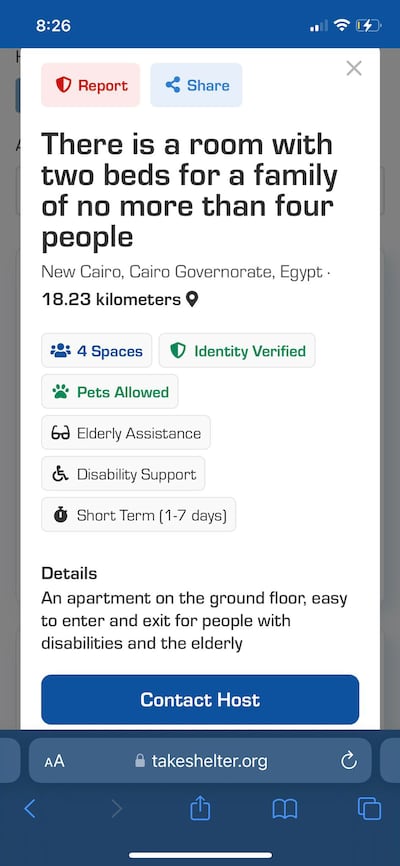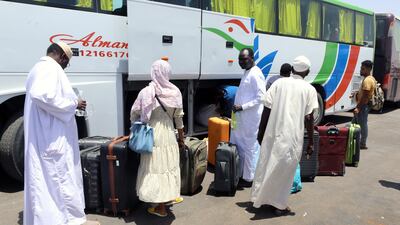A man who helped 100,000 Ukrainians find shelter when war broke out has now turned his efforts to Sudan's conflict.
Avi Schiffmann, 20, acted swiftly as reports of thousands of people fleeing fighting in Sudan's capital Khartoum and other cities began to surface, taking the concept of his UkraineTakeShelter website and giving it a new purpose.
More than 50 people signed up as host families for Sudanese refugees in the first 24 hours of the TakeShelter site being online.
Mr Schiffmann is applying the same techniques to the Sudanese crisis that he used to help house tens of thousands of Ukrainians with host families.
“You just sign up and go through a verification identity process where you scan a government-issued ID which is cross-checked against your face with facial recognition, and then you're able to post listings,” he told The National.
A moderation team checks every post. Users are also allowed to report listings if they breach the website's rules.
“For people displaced, they go to TakeShelter.org — they just put in the search bar where they're headed or where they are right now and they're able to get housed as quickly as possible,” he said.
He believes that using the internet to do good has wider benefits.
“It takes the strain away from local relief efforts and that way they can focus on people in need of immediate medical attention rather than people who can go on their phones and get shelter."

Diaspora springs into action
Sudanese professor Saria Awadalla's father and brother have chosen to stay at their home in Omdurman.
But the majority of his family members decided it would be safer to leave.
“They're in various stages of evacuation. Some relatives are on the border with Egypt having just arrived today [Thursday]. They've been on the road since Sunday,” he said, speaking from Chicago, Illinois.
“I've been looking online for apartments for relatives arriving in Cairo. I'm also searching for the best route for them to take, what to avoid and what to bring with them.”

Sudanese civilians have been using the internet as a tool ever since the conflict between the Rapid Support Forces paramilitary group and Sudan's army broke out on April 15.
Some are sending out calls for help to look for missing relatives, while others are assisting people seeking medical assistance by connecting them to volunteers and people offering supplies.
“We are in dire need of a vehicle from Yathrib to 60th Street tonight, urgently,” Twitter user Reema wrote on Wednesday.
Yousif AlKheir is a Sudanese trader, bringing supplies in and out of Sudan through Aswan. He suspended his work once the crisis began, he told The National.
Now, he is trying to help people cross the border.
“I am currently [at] the Egyptian border and in Halfa in case of questions regarding the Sudanese or Egyptian borders,” he wrote on Twitter, along with information on obtaining visas.
These tools are vital in making an already difficult journey slightly less arduous.
“Most people who have fled Khartoum are heading to a place called Kandahar in Omdurman," he said.
"That's where the majority of buses are leaving from. There, bus drivers are only accepting Sudanese pounds in cash due to a dire need for cash."
Sudan's banks have mostly been closed since the street battles broke out.
“Many families have people, like myself, living abroad, who send them money in US dollars. But since only Sudanese pounds are being accepted in these makeshift locations, traders are on standby exchanging dollars for Sudanese pounds at 30 pr cent to 40 per cent below market rate,” he said.
A typical bus ticket to Egypt costs about $50 to $80, Mr Awadalla said.
“Now, if you're lucky, you can get on board for about $600.”
When his family went to that spot in Omdurman, they had to wait a day and a half to board a bus, he said.
“They slept on the road, on the ground. They went through whatever food supplies they had and paid huge sums of money for things like water and basic necessities.
“Their bus broke down a number of times. It took a while to get to the border.”
More than 10,000 people have crossed into Egypt from Sudan in the past five days, Egyptian authorities said. An estimated 20,000 people entered Chad and 16,000 went to South Sudan.
On Wednesday, Sudan's consul general in Aswan told Sudanese civilians to stay in the country if they flee, as some were being deported from the border due to overcrowding and lack of resources.
The conflict has so far killed more than 500 people, although witnesses say figures are likely to be higher, and videos have shown bodies lying on the streets waiting to be collected.


